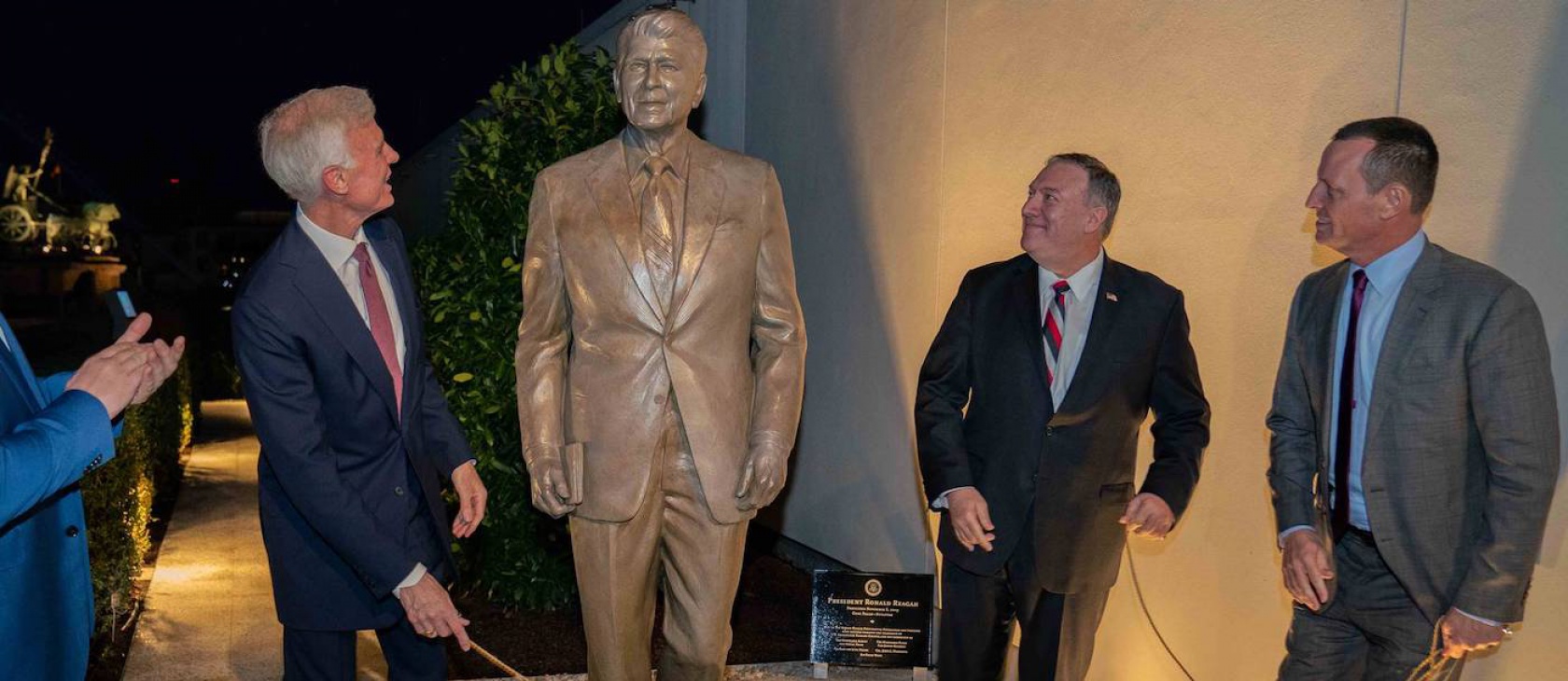In the early church, new converts would often raze pagan temples and build Christian churches on the ruins. A secular version of this triumphant gesture took place this weekend as the unveiling of a statue of President Ronald Reagan, and an invocation of God, took place on the toppled remains of the Berlin Wall.
“We stand on a piece of real estate that was part of the kill zone,” said Secretary of State Mike Pompeo at the statue’s unveiling. “It was a no man’s land.”
The Berlin Wall sealed the former U.S. Embassy behind enemy lines. After the Communist-erected barrier fell 30 years ago this month, the U.S. began building a new Embassy on the grounds in 2004, which opened in 2008.
On the thirtieth anniversary of the historic event last Saturday, Secretary Pompeo and other diplomatic staff unveiled a seven-foot-tall bronze statue of the former president, commissioned by the Reagan Foundation.
The statue overlooks the spot where Reagan delivered his famous speech of June 12, 1987, in which he challenged the last leader of the Union of Soviet Socialist Republics, “Mr. Gorbachev, tear down this wall.”
Pompeo, who began his service as an armor officer in Germany just one year before that speech, revealed “I had two instances where I saw people try to make a break across that very space.”
“President Reagan was an indispensable leader of the signal American mission to defend unalienable rights,” Pompeo said.
In a separate speech last Saturday on “the Lessons of 1989,” Pompeo noted the importance of having “national leaders with a deep faith in God, and human dignity,” as well as “confidence in free peoples.”
He quoted President Reagan’s firm belief that “freedom is not the sole prerogative of a chosen few. It is the universal right of all of God’s children.”
Pompeo said, “The Declaration of Independence started it all when it said that all men are ‘endowed by their Creator with certain unalienable rights.’”
However, the toppling of the Berlin Wall did not begin with Ronald Reagan, and the notion that human dignity limits government did not originate with the United States.
“Behind the Iron Curtain, a brave and noble group of East German citizens refused to remain chained inside a communist system that denied the inherent worth of every individual,” Pompeo acknowledged. “Indeed, they are the real heroes of this story.”
More importantly, the notion of inalienable rights and political liberty grows out of the Judeo-Christian view that God created all human beings in His own image and endowed them with a soul that yearns to seek Him, reason that learns how they can best serve Him, and free will that allows them to gratefully offer their service to Him (or, if they choose, to withhold it).
Socialism teaches that human nature is malleable, perfectible, and rooted in class consciousness. The bourgeoisie can never understand the consciousness of the proletariat and must simply be eliminated. “The liquidation of fascism must be the liquidation of the bourgeoisie that created it,” wrote Marxist theorist Antonio Gramsci.
After denying human dignity, socialism denies human agency by circumscribing economic freedom. This forces workers to participate in the “inevitable” triumph of Communism. It also has the side effect of rendering them completely dependent on the goodwill of their rulers for survival. Pompeo noted this over the weekend:
The Wall wasn’t there to keep the West out. It was there to keep the East German people in. That’s how authoritarian regimes operate then. It’s how they operate today. They force people against their own will to not have the capacity to sustain themselves and be dependent on that regime.
As Reagan’s close ally, the late Jack Kemp, once said, “Economic freedom is inseparable from political freedom.”
“Freedom of thought and freedom of economic initiative are the lynchpins of a prosperous society,” Kemp said.
A Christian view of human dignity is the foundation for these lynchpins. And after 28 years of living behind the Berlin Wall, a Christian view of the human person again stands in triumph on the spot of a vanquished foe.
You can watch the unveiling below.
Today we dedicated a statue of Ronald Reagan atop the US Embassy Berlin on the new Ronald Reagan Terrace. #BerlinWall30 pic.twitter.com/uZ2hGv6hST
— Richard Grenell (@RichardGrenell) November 8, 2019
(Photo credit: U.S. State Department. Public domain.)








